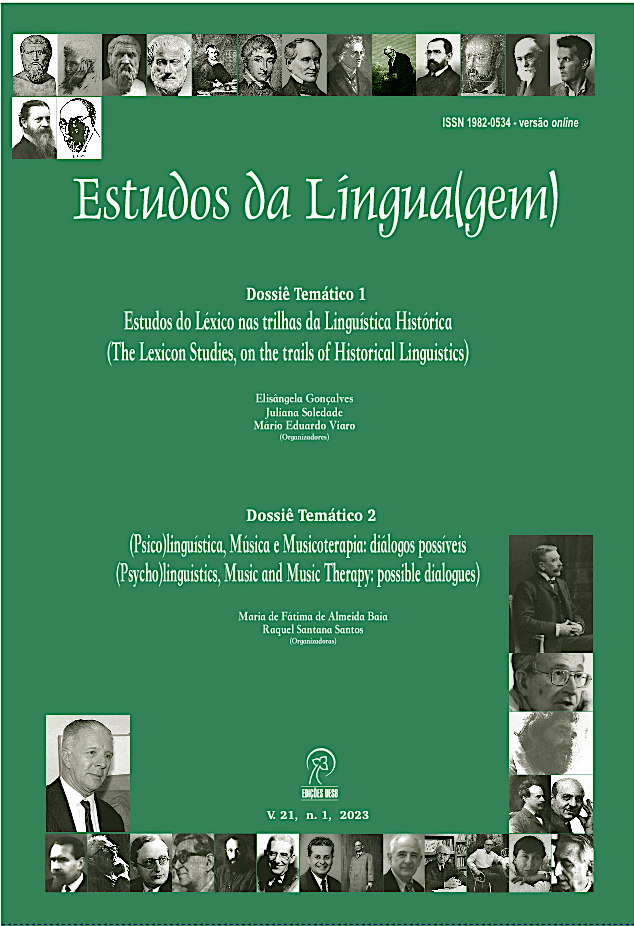The time and its parts: lexicon catalog in the 1st book from André de Avellar’s Reportório (1594)
DOI:
https://doi.org/10.22481/el.v21i1.10201Keywords:
Chronographia ou reportorio dos tempos. André de Avellar. 16th Century. lexicon studies.Abstract
In the Iberian Peninsula there was a prominent interest in the motion of stars, under Alfonso X of Castile reign. During this period a lot of astronomical and philosophical texts from Greece and the East has been translated and this movement is known as The Toledo School of Translators. In the 15th and 16th centuries this was subject in many impressions, including the first times repertoires that was productions about astronomical and astrological texts, subject rising in this period. This work, based on descriptive analysis about the third edition of Chronographia ou reportorio dos tempos, printed in 1594, and André de Avellar’s biography, contains considerations about testimonial value from remaining repertoires and interpretative notes about 19 lexical items collected from the first book entitled The time and its parts, based on text transcription and in accordance with the methodological assumptions from historical-variational lexicography.
Downloads
References
ARQUIVO NACIONAL TORRE DO TOMBO. Processo de André do Avelar, 1620. Disponível em: https://digitarq.arquivos.pt/details?id=2352008. Acesso em 28 out. 2021.
AVELAR, A. Chronographia ou reportorio dos tempos o mais copioso que te agora sayo a luz conforme a noua reformação do sancto Papa Gregorio XIII / feito por Andre de Auellar - Nesta terceira impressão reformado & acrecentado pello mesmo author. Lisboa: Casa de Simão Lopez, 1594.
BARREIRA, A. Estatutos da Vniuersidade de Coimbra. Confirmados por el rey Dom Phelippe primeiro deste nome, nosso Senhor em o anno de 1591. Coimbra: Universidade de Coimbra, 1593
COSTA, A. B. O "Reportório dos Tempos" de André do Avelar. A astrologia em Portugal no século XVI. Rio de Janeiro: Booklink; São Paulo, FAPESP; Campinas, GHTC (Scientiarum Historia et Theoria, vol. 2), 2001.
FARIA, E. Dicionário Escolar Latino – Português. 3. ed. Rio de Janeiro: Ministério da Educação e Cultura, 1962.
FONTES, L. A. História e narrativa na Baixa Idade Média: a escrita do poder afonsino. In: ZIERER, A.; VIEIRA, A. L. B.; ABRANTES, E. (org.). Nas trilhas da Antiguidade e Idade Média. São Luís: Editora UEMA, 2014, p. 265-270.
LI, A. Repertorio de los tiempos. Zaragoza: Pablo Hurus, 1495.
MACHADO FILHO, A. V. L. Lexicografia histórica e questões de método. In: LOBO, T., CARNEIRO, Z., SOLEDADE, J., ALMEIDA, A., e RIBEIRO, S.(org.). Rosae: linguística histórica, história das línguas e outras histórias. 1ed. Salvador: EDUFBA/FAPESB, 2012, v. 1, p. 381-389.
MACHADO FILHO, A. V. L. Do conceito de “variante” nos estudos do léxico de perspectiva histórico-variacional. Filologia e Linguística Portuguesa, 16(2), p. 261-275, 2014. https://doi.org/10.11606/issn.2176-9419.v16i2p261-275. Acesso em 20 de junho de 2022.
MACHADO FILHO, A. V. L. Novo dicionário do português arcaico ou medieval. 2 ed. Columbia: Amazon, 2019.
MACHADO FILHO, A.V. L; SAMPAIO, L. R. T. A Edição de Textos no Contexto da Lexicografia Histórico-Variacional. In: OSÓRIO, P. (org.). Linguistics and Philology Revisited: contributos para a instrumentalização das Humanidades Digitais. Universidade de Beira Interior, 2021.
MACHADO FILHO, A.V. L; NASCIMENTO, I. P. S.; SAMPAIO, L. R. T. Variação lexical no contexto das obras lexicográficas. Labor Histórico, v. 6, 2020, p. 61-87.
MCKENZIE, D. F. Bibliografía y sociología de los textos. Tradução Fernando Bouza. Madrid: Akal, 2005 [1986].
MARTINS, R. A. André do Avelar and the Teaching of Sacrobosco s Sphaera at the University of Coimbra. In: VALLERIANI, Matteo. (org.). De sphaera of Johannes de Sacrobosco in the Early Modern Period. Cham, Dordrecht: Springer International Publishing, 2020, p. 313-358.
MATTOS E SILVA, R. V. O português arcaico: fonologia, morfologia e sintaxe. São Paulo: Contexto, 2006.
MATTOS E SILVA, R. V. Reconfigurações socioculturais e lingüísticas no Portugal de quinhentos em comparação com o período arcaico. Alfa, São Paulo, v. 45, p. 33-47, 2001.
MONTEIRO, F. C. M. A Escola de Tradutores de Toledo: a oralidade da escrita. Cadernos de Literatura em Tradução, n.23, p. 417-435, 2021. Disponível em: <https://www.revistas.usp.br/clt/article/view/188374>. Acesso em: 9 ago. 2021.
SAMPAIO, L. R. T. Entre a Filologia e a Lexicografia Histórica: notas sobre a elaboração de uma edição das cantigas satíricas do Cancioneiro da Biblioteca Nacional para o estudo do léxico. Filologia e Linguística Portuguesa, 22 (Especial), p. 33-49.
SCHWARCZ, L. M. Introdução: "um repertório do tempo". Revista USP, n. 81, p. 18-39, 2009. Disponível em: <https://www.revistas.usp.br/revusp/article/view/13728>. Acesso em: 21 jun. 2021.
Downloads
Published
How to Cite
Issue
Section
License
Copyright (c) 2023 Language Studies

This work is licensed under a Creative Commons Attribution 4.0 International License.

Estudos da Língua(gem) is licensed under a Creative Commons Attribution 4.0 International License.
Authors who publish in the journal Estudos da Língua (gem) agree with the following terms:
The journal Estudos de Língua(gem) maintains the copyrights of the contributions published. These rights include the publication of the contribution and make its content available for free through the portal.







